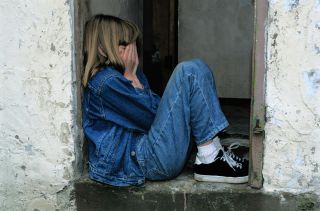As a trained mental health practitioner and a family life educator, I was disturbed when former Fox TV host Tucker Carlson recently shared a fantasized story about “Daddy” Donald Trump coming home to spank his teenage daughter—a metaphor that the nation needed a good spanking.
There has to be a point at which Dad comes home. And he’s pissed. Dad is pissed. He’s not vengeful. He loves his children. Disobedient as they may be, he loves them. Because they’re his children. They live in his house. But he’s very disappointed in their behavior. And he’s going to have to let them know…Get to your room right now and think about what you did.
And when Dad gets home, do you know what he says? You’ve been a bad girl. You’ve been a bad little girl, and you’re getting a vigorous spanking right now. And no. It’s not gonna hurt me more than it hurts you. No it’s not. I’m not gonna lie. It’s gonna hurt you a lot more than it hurts me. And you earned this.
You’re getting a vigorous spanking because you’ve been a bad girl. (Tucker Carlson, October 23, 2024)
Then the crowd he was speaking to erupted into loud cheers! While this fictionalized story is about correcting a misbehaving daughter’s behavior, it may give his listeners the wrong message—it’s okay to spank children.
High-Profile Role Models
The fact is we live in an influencer culture. What happens when a high-profile influencer like Tucker Carlson uses his platform and celebrity to speak about spanking in this way? Words, stories, and metaphors have power, especially from a prominent influential person. They may reinforce attitudes and behaviors that already exist in some listeners while encouraging others to adopt them.
Albert Bandura’s Social Learning Theory
Is it possible to learn a behavior simply by watching another person perform that behavior? Is it possible for individuals to adopt new behaviors after watching an influential character in a movie, or hearing about the behavior in a fictionalized story? According to Albert Bandura, and social learning theory, it is.
Bandura’s research demonstrates that “Most human behavior is learned observationally through modeling: from observing others one forms an idea of how new behaviors are performed, and on later occasions, this coded information serves as a guide for action” (Banura, 1977).
Social learning theory identifies three basic models of observational learning:
(1) a live model
(2) a verbal model
(3) a symbolic model
(Nabavi, 2012)
- Live models involve an individual demonstrating or acting out a specific behavior in person. For example, demonstrating how to spank a child in public.
- Verbal models involve instructions or descriptions of a behavior given through spoken words. For example, when Tucker Carlson says, “You’ve been a bad girl. You’ve been a bad little girl, and you’re getting a vigorous spanking right now.“
- Symbolic models involve real or fictional characters and behaviors portrayed in stories through speeches, books, movies, television, and online media. For example, when Tucker Carlson tells the fictional story of an irate father spanking his naughty daughter. “And no. It’s not gonna hurt me more than it hurts you. No, it’s not. I’m not gonna lie. It’s gonna hurt you a lot more than it hurts me. And you earned this. You’re getting a vigorous spanking because you’ve been a bad girl.”
Yes, words, stories, and metaphors have power, especially from a prominent influential person. They may reinforce attitudes and behaviors that already exist in some listeners while encouraging others to adopt them.
Corporal Punishment Makes Things Worse
Researchers have studied the effects of spanking (physical punishment) on children for more than 50 years (Erickson, 2022). The outcomes of these studies are pretty grim. Spanking (physical punishment) is associated with the following:

Source: Pixabay/Pexels
After reviewing the history of and research on spanking, Dr. Christina Erikson, author of Spanked: How Hitting Our Children Is Harming Ourselves concludes that spanking not only hurts the child, it also hurts the parent who uses it as a form of punishment.
- Hitting makes it harder to build positive family interactions.
- Relying on spanking limits a parent’s parenting tool options.
- Parents who start spanking mildly tend to spank more harshly within a year.
- Parents who spank lack parenting tools and knowledge, and as a result, feel overwhelmed and underskilled.
- Parents who spank feel powerless.
- Parents who use corporal punishment lack effective communication skills.
Parenting is a very challenging job. Effective parenting skills are not innate, they are learned just like everything else. Here are several tools I think every parent needs in their parenting toolbox:
- A firm understanding of child development.
- Learning to redirect a child to more desirable behavior.
- When possible, ignore inappropriate behaviors.
- Reinforce appropriate behavior by “catching them being good.”
- Use time-outs.
- Control the environment (put things out of reach).
- Play with your child.
- Listen to your child.
- Set limits. Be clear, concise, and consistent with your expectations.
- Give reasonable consequences and follow through.
- Develop routines and schedules for your children.
- Be calm and consistent. Take a moment if you have to before you act.
- Like everything in life, parenting skills need practice.
Social Learning Theory Essential Reads
For more details on these skills: The Good Parent’s Toolbox.
Practice Aloha. Do all things with love, grace, and gratitude.
© 2024 David J. Bredehoft.

